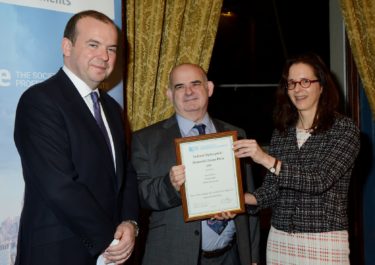Blog | 11 Apr 2020
Rybczynski prize-winning essay: How robots change the world

Rybczynski prize-winning essay on the impact on regional inequalities
Oxford Economics’ Edward Cone, Richard Holt and Michael Zielenziger won the 2019/20 Society of Professional Economists Rybczynski Prize Essay Competition, with a fascinating piece on the impact of robots on regional inequalities. The Rybczynski Prize is awarded to the best piece of writing on economics.
By the use of econometric modelling, our team have shown that there are overall gains despite significant job losses within industries. Crucially, however, we find that those regions whose residents have lower income levels have tended to lose twice the number of jobs, per robot, compared with those regions with higher average income levels.
The consequence is a significant risk that in countries such as the United Kingdom, regional inequalities will increase—a challenge potentially made even greater as robots spread to occupations that have traditionally provided the destination for displaced factory workers. This creates a challenge for policy makers, who are likely to face political pressures to spread the dividends of robotization more evenly. Recent political developments across a range of advanced economy nations suggest that the pressures on policy makers are already mounting.
About Oxford Economics
At Oxford Economics, our mission is to help our clients better understand an ever-more complex and fast-changing world economy. With the world on the cusp of this new industrial revolution, we are pleased to share the findings of our extensive research study into these profound economic shifts with everyone interested in the shape of things to come.
That is why we brought together a team of our economists, econometricians, modellers and technology experts from across our worldwide network of over 250 analysts to conduct an extensive research study to analyse the robotics phenomenon.
Our economic consulting and thought leadership teams are world leaders in quantitative economic analysis and original, evidence-based research, working with clients around the globe and across sectors to build models, forecast markets, run extensive surveys, and evaluate interventions using state-of-the art techniques.
About the Rybczynski prize
In 2000 the Society inaugurated an annual prize for economics writing in memory of Tadeusz Rybczynski, an eminent economist and former Society Chairman.
The Rybczynski Prize is awarded to the best piece of writing on economics, as judged by the SPE Council. The judges look for high-quality submissions on an important real world economic issue which merits wide attention among professional economists. The style of the piece should make it accessible and interesting to an economically literate business audience.
Oxford Economics’ team is expert at applying advanced economictools that provide valuable insights into today’s most pressing business, financial,and policy issues.
To find out more about our capabilities, contact:
EMEA
Sam Moore
+44 (0)207 803 1415
Email
Americas
Hamilton Galloway
+1 (646) 503 3068
Email
Asia
Peter Suomi
+65 6829 7198
Email
Related Services

Post
The economic impact of abandoning the WTO
Oxford Economics have been commissioned by the International Chamber of Commerce (ICC) to provide an independent assessment of the economic impact of WTO dissolution. This report details our findings and the assumptions underpinning our analysis.
Find Out More
Post
The economic impact of the sports activities of public service media
This study shows how the sports activities of public service media supported €4.5 billion of GDP and 57,000 jobs across 31 European countries in 2022. The report also highlights wider economic benefits of public service media sports coverage, such as the way in which it leverages sponsorship income for sports bodies.
Find Out More
Post
Global Trade Education: The role of private philanthropy
Global trade can amplify economic development and poverty alleviation. Capable leaders are required to put in place enabling conditions for trade, but currently these skills are underprovided in developing countries. For philanthropists, investing in trade leadership talent through graduate-level scholarships is an opportunity to make meaningful contributions that can multiply and sustain global economic development.
Find Out More